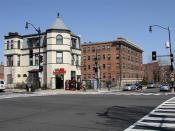In his book The Unheavenly City, political scientist Edward Banfield explains urban poverty as the end result of what he calls "the logic of metropolitan growth," (23). Many of the urban poor, Banfield argues, come to the city in search of better opportunities, bringing with them lower-class behavior patterns that are passed on to their children and that are inconsistent with the labor markets in urban areas and the polite sensibilities of the upper-class, urban inhabitants. Without going into further detail on the causes of these lower-class behaviors, Banfield focuses on the negative habits of the urban poor and firmly believes that they will end their poverty only when they change their habits. However, Banfield's theory does not touch upon the roots of this culture of poverty; it does not answer why there are lower classes, or why the poor view the urban labor market with such a high degree of fear, disappointment, and anger.
It is likely that a culture of poverty does indeed hamper one's chances of rising to higher socioeconomic ranks. However, the direction of cause and effect does not run in only one direction. The American social, political, and economic structures themselves -- the same institutions whose purpose is to open new doors of opportunity for disadvantaged people -- also maintain and feed into this culture of poverty. Increases in the minimum wage have lagged well behind inflation (Levy, 183), relegating the poor to low-income jobs carrying little or no benefits. Mediocre schooling for minorities has "contribute[d] to black-white achievement differences," (Sourcebook, 355). And inequality in after-tax income has grown faster than inequality in pre-tax income (Levy, 208), providing indication of a tax system that allows few financial breaks for poor families to invest in higher education and training for their children. Therefore, the culture of...


